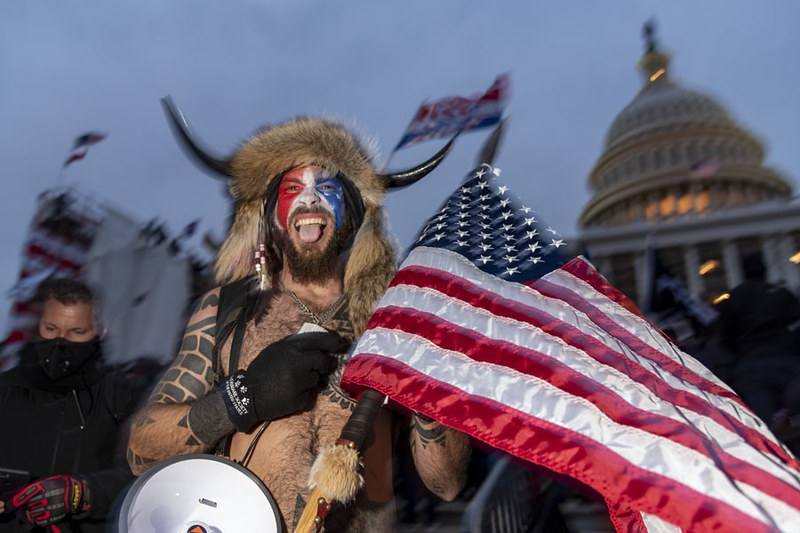
The Hour of the Barbarian
Which America is the true one?
Soon after Trumpists stormed the United States Capitol last Wednesday, politicians, entertainers, and brands began to weigh in. A theme emerged. “This is how election results are disputed in a banana republic—not our democratic republic,” tweeted George W. Bush, the former US President and the son of a CIA director. Bush should know that the original “banana republics” were the intentional creation of Washington foreign policy and North American corporations, most famously the United Fruit Company. In the early 20th century, when O. Henry reportedly coined the awful term, the US government intervened dozens of times in Central America, with the effect of maintaining brutal extraction regimes that served the interests of international capital and US consumers. Banana republics are an all-American invention.
Bush wasn’t the only one randomly grasping for imagery from the bad, brown world beyond our borders to describe the scenes that have unfolded on all our screens over the past few days. “It’s surreal. I feel like I’m talking to a correspondent reporting from Bogotá,” CNN correspondent Jake Tapper told a reporter, apparently free associating. “For nearly 250 years, the United States of America has stood as a beacon for democracy,” tweeted the Coca-Cola company. “What happened in Washington, DC is an offense to the ideals of democracy.” Marco Rubio and Meghan McCain said the images belonged in the “Third World.” For his part, President-elect Biden said that the events “do not reflect a true America, do not represent who we are.” But then, which America is the true one?
“Third World,” of course, did not begin life as a derogatory term for “developing nations.” It was a forward-thinking, optimistic, intentional project, through which the world’s downtrodden peoples would take their rightful place alongside the West and the Soviet Union. That project fell apart in the ’60s and ’70s, for a few reasons—but prominent among them was the barrage of murderous US-backed interventions unleashed upon political movements perceived to threaten the US-led capitalist order. Regime change operations entirely reshaped life in Latin America, Asia, and Africa. Ironically, when we now struggle to understand exactly what does and does not qualify as a right-wing “coup,” we will usually look to these classics of the genre.
Writing in 1950, as Europe’s overseas empires began to fall apart, Aimé Césaire declared that fascism had been the logical consequence of colonialism. In order to justify systematic plunder, white nations had needed to work very hard to create the myth that they were “civilized,” and the rest of the world beasts. But through the very act of colonization, Europe itself became savage—and would eventually turn the horrific methods it had perfected abroad on itself. The era of US global domination, he wrote in “Discourse on Colonialism,” would be worse still: “The hour of the barbarian is at hand. The modern barbarian. The American hour. Violence, excess, waste, mercantilism, bluff, conformism, stupidity, vulgarity, disorder.” I reread Césaire’s essay on Monday, while scrolling through more images of a shirtless man in horns and pausing to watch a video of Arnold Schwarzenegger brandishing the sword from Conan the Barbarian.
What happened on January 6 was profoundly American, emerging as it did from our long and very specific history. No one did this to us. But despite the geographic confusion, Bush, Tapper, and McCain correctly identified that nothing like it has happened here for a long time. Presidential scholar Nicole Hemmer told the Financial Times that the Trump-Biden transition “cannot be categorized as a peaceful transfer of power.” For the elites speaking to the nation that day, no good domestic analogies were ready to hand. In reality, in the era of US global hegemony, the line between the US’s own history and that of “Bogotá” has not really existed for a very long time. We inhabit a global system, and if regime change happens somewhere around the world, there is a good chance the United States government is somehow involved. What happened on Wednesday is that mainstream commentators responded to the fictional distinction between civilization and its opposite violently falling apart, for all the world to see.1
To survive, the legend of American exceptionalism needed its imagined inverse, whether in Indian territory or across the border with Mexico. Over the weekend I asked Yale historian Greg Grandin about the use of Latin American comparisons as a way to reflect or deflect from the problems of American liberalism. “That’s been going on forever,” he told me. “Latin America as an unstable place—with a tendency to be ruled by dictators, or roiled by mobs threatening property rights—has long been held up as the antithesis of everything the US was meant to be.” Grandin’s book The End of the Myth suggests that Trump is in many ways the inevitable consequence of our own imperialist war-path, which began not with overseas conquest but in North America. White settlers kept pushing outward from the original settlements until there was nowhere else to go, and so we finally turned on ourselves. He also demonstrates how often extremist movements in the United States have been powered by veterans returning home from war. Among other troops involved in Washington last Wednesday was Ashli Babbitt, the Californian woman shot and killed in the raid, who served tours in Iraq and Afghanistan for the Air Force. One of the men photographed carrying zip ties, which can be used to take hostages, identified himself as a decorated pilot who also fought in the war on terror.
What would happen if we took the Latin American comparisons on their own terms, rather than as an opportunity for slander or misdirection? The Maya-K’iche’ historian María Aguilar, who grew up in the highlands of Guatemala, suggested that the recent events in the US most resembled a doomed attempt at an “autogolpe,” or self-coup. The most famous form of the right-wing coup, with military clearly intervening and taking over, has largely given way to more subtle power grabs that ostensibly take place within existing institutional structures: the “parliamentary coup,” or judicially powered “lawfare” we have seen in Paraguay and Brazil. Hardly a master strategist, it seems that in the past two months Trump variously directed his perceived underlings to try all three. Tellingly, one rationale offered for the attempts was the very same employed in Bolivia in 2019 to help depose—with the support of US liberal elites—Evo Morales: deny the validity of late-counted votes from Indigenous strongholds that tipped the scales after initial reports.
The moral distinction between the West and the rest is fallacious; the material difference is very real. The United States is still the richest nation in history, and life there has never felt like it did in “banana republics”: after the 1954 CIA coup that deposed Jacobo Árbenz (with the active support of United Fruit), Guatemala devolved into devastating civil war. The US-backed military killed hundreds of thousands of people, carrying out genocide against Maya peoples into the 1980s, to suppress the perceived leftist threat. “For a lot of people in Guatemala and across Latin America, Wednesday did not surprise us,” Aguilar told me. “It is a type of political violence we are used to seeing, except this time we saw it in the country where it usually originates. It is often instigated or created or pushed forward by the United States with the claim it would bring democracy or order to our uncivilized countries.”
But must we analogize at all? The reaction to the carnage on Capitol Hill made it clear how many US elites are deeply ignorant of the world outside our borders, and incapable of confronting our own past—even that which happened just yesterday. If indeed America has become barbaric, through what we have done around the world, and on our own soil—the only solution is to look the beast squarely in the eye.
- As it happens, Trump’s attempts at conducting regime change in “Bogotá” have been as messy and ultimately ineffective as his mission to “stop the steal” at home. The same day as the raid on the Capitol, the European Union announced that it would no longer recognize Juan Guaidó, the man designated by the United States to take over in Caracas, as Venezuela’s legitimate head of state after he lost control of the National Assembly.







